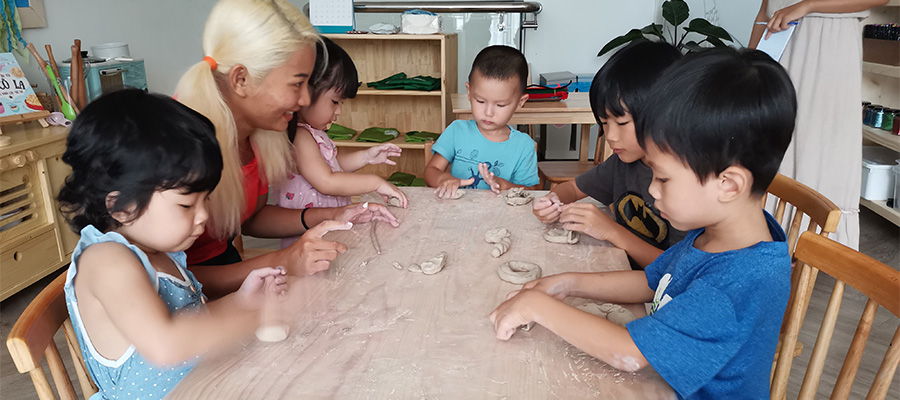

Pottery
Many studies have shown that the period of children from 0 - 6 years old is the period of perfecting gross and fine motor, helping children to be able to self-serve, and as a premise for future learning of children in Primary education - perfecting the hand motor skills is one of those big goals. Through practising life and playing activities in Ukiyo, children have the opportunity to practice these movements independently and happily. In addition, they find pottery making is a very interesting activity and helps a lot in perfecting skills at this stage.
In addition to supporting to perfect the arm's rough motor skills, and the motor skills of the fingers - pottery moulding also helps children develop other skills such as hand-eye coordination, problem-solving, developing aesthetics, and bringing a sense of accomplishment, helping to calm children and build discipline... All are extremely important in enforcing a child's development.
So, why is making pottery from natural clay better than playdough or artificial clay?
Playdough or artificial clay is quite soft compared to natural clay, so children only need a little force of impact to be able to form it. In addition, play dough will not dry out during play, yet clay will dry out quite quickly if you make small details, fragments and some other unique characteristics that your child needs to keep in mind. So, using clay to shape is a small challenge for children to improve their motor skills as well as forcing children to calculate and manipulate so that the work goes smoothly and reasonably. For example, if a child finishes squeezing the handle of a cup of tea but leaves it aside for another step without attaching to the body of the cup, after a while, the handle won't be able to be attached anymore but has to be reworked, or if Children do not cut holes when the clay is still wet but let it dry, it will be very difficult to cut out and take a lot of time... That's why children need to remember the properties of the soil, the steps to follow the correct procedure and arrangement.
In addition, rotation also helps children develop an extremely good feeling of their motor skills. When rotating Ceramic, children need to feel the feeling of the earth to adjust the force of their fingers so that the product is created as desired - too thin will break when picked up, however too thick will not be suitable. If the force of the finger is not evenly distributed, the product will be distorted... To succeed in this job and the ingenuity of the young hands, it is necessary to have patience and perform slowly step by step. Therefore, making Pottery helps children to build the will, intrinsic confidence when overcoming initial difficulties and completing a product as they want.
A sense of accomplishment and self-expression are two other aspects that pottery work brings to children. Naturally, for a child's work, the process is always more important than the outcome. Regardless of the results, children still learn a lot in the process of their work. But children also love to express themselves, when creating something to show off to friends and adults or give it to others, they are delighted and proud. Having a finished piece of work to save, or give as a gift for relatives or friends will add a special value to a child's life.
Pottery moulding creates objects in a three-dimensional space, from their ideas expressed through their hands. It helps children develop their creativity and transforms thoughts into actions, and results are produced. Besides, creating a product in an actual model requires the child to understand spatial awareness. Children need to move the specimen around and move around it to see all the faces and see its shape and texture. This helps children when creating art and helps to navigate in the real world around them. Making pottery helps children learn to plan and solve problems as they create their three-dimensional puzzle pieces. Children will have to ask themselves: How big and how tall can I make this vase? By doing this, will it stand or fall? Should the piece open and close?...
Working to create clay art allows children to explore challenges, solve problems, and learn to recover from their mistakes as they happen. When children make mistakes in moulding, but know how to fix or solve the problem, it gives them more confidence of knowing how to fix it. The ease of repair of clay allows kids who are afraid of failure from being stopped by mistakes. This helps them to understand that they can recover, learn and continue from moments of failure in their lives.
In addition, making Pottery also helps children to build calmness and perseverance. Children tend not to focus on one task for too long, but can be fascinated with their work when working with clay. The reason that children can be fascinated with their work is due to the physical properties of clay. Children can easily act on it to produce the results they want, have the opportunity.



